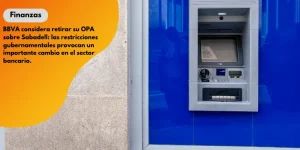Entendiendo la consulta pública española sobre la OPA del BBVA sobre el Banco Sabadell

Anúncios
Introduction to BBVA’s Takeover Bid
The Spanish banking sector is buzzing with news of BBVA’s public acquisition offer, known as an OPA, for Banco Sabadell.
This takeover proposal is more than just a high-profile corporate move—it’s set to reshape Spain’s financial scene.
BBVA and Banco Sabadell are two of the country’s most prominent banks, and their merger could create a giant with increased market influence, more branches, and a stronger balance sheet. That’s why so many eyes are on the details of this deal.
Anúncios
This merger holds particular significance for Spain.
The consolidation could affect everything from competition to access to banking services, impacting citizens, companies, and the economy at large.
With such a far-reaching impact, the Spanish government wants to make sure the deal serves the public good.
Anúncios
To address public interest concerns, the Ministry of Economy has decided not to move forward without first gathering input.
In a new twist for major takeovers, they have opened a public consultation process.
This move ensures that the voices of everyday citizens, associations, and other stakeholders can be considered before any big decisions are made about the future of Spanish banking.
Next, let’s dive into how this public consultation process is being rolled out and who can get involved.

The Public Consultation Process
How the Consultation Works
Spain’s Ministry of Economy has launched a public consultation about the proposed takeover of Banco Sabadell by BBVA, ensuring voices from across society are heard during this major financial decision.
Participation is easy and entirely online. Anyone interested—citizens, organizations, associations, and economic agents—can fill out a form on the Ministry’s website.
The window for submitting opinions and feedback runs until May 16, making this a real opportunity for the public to weigh in on a headline banking merger.
Who Can Participate
The consultation is highly inclusive.
Whether you’re an individual concerned about local banking services, an association with sector knowledge, or a business potentially affected by the merger, your input is welcome.
By opening the process to such a broad audience, the government aims to gather diverse perspectives on the potential impacts of the deal.
The Ministry’s Role
It’s the Ministry of Economy leading this process, showing a commitment to transparency and proactive governance.
Their goal is to collect thorough, detailed insights from a wide range of stakeholders before making any major decisions.
This approach reflects a growing emphasis on ensuring that significant economic moves, like this bank merger, align with the nation’s best interests and broader societal values.
With the public’s input now being gathered, attention will soon turn to the specific matters raised in the consultation form.
Key Questions in the Consultation Form
The Main Question and Its Purpose
The center of Spain’s public consultation on BBVA’s bid for Banco Sabadell is a straightforward, yet significant, question:
Do you believe there are general interest criteria, besides competition defense, that could be affected by this operation?
This question encourages respondents to look further than market competition.
It invites thoughtful consideration of broader national concerns—ones that reach into public well-being and critical infrastructure.
General Interest Criteria to Consider
To guide participants, the form lists several general interest criteria inspired by Article 10.4 of Law 15/2007.
These include:
- National defense and security
- Protection of public safety or health
- Free movement of goods and services
- Environmental protection
- Promotion of technological research and development
- Maintenance of sector-specific regulatory goals
- Other (with space to elaborate)
Participants check off the areas they think could be affected.
If “Other” is selected, there’s an open text box to describe additional concerns (up to 2,000 characters).
Providing Detailed Feedback
The format is designed to be user-friendly.
If respondents believe any criteria will be affected, they are prompted to give more detail—how might the BBVA/Sabadell merger impact these areas?
There is a separate section for suggesting potential measures to guard these interests, each allowing up to 2,000 characters.
This structure encourages both concise and nuanced responses, making every voice count in the review process.
With the main questions laid out, the conversation now shifts to what the law specifically defines as relevant general interest criteria.
General Interest Criteria Under Consideration
When looking at BBVA’s takeover bid for Banco Sabadell, public authorities in Spain are not just weighing competition concerns.
The public consultation rolled out by the Ministry of Economy goes further, drawing from Article 10.4 of Spain’s Law 15/2007 on the Defense of Competition.
This legal foundation ensures that merger reviews cover a broad set of “general interest” factors that could have far-reaching national effects.
| 🔍 Criterio | Pregunta de Evaluación |
|---|---|
| 🛡 Defensa nacional y seguridad | ¿Podría la fusión afectar infraestructuras críticas o sectores sensibles? |
| 🏥 Salud pública y seguridad | ¿Existe riesgo de impacto negativo en el bienestar social? |
| 🔁 Libre circulación | ¿La operación podría dificultar el flujo económico dentro o fuera de España? |
| 🌱 Protección ambiental | ¿Hay consecuencias sobre sostenibilidad o financiación verde? |
| 💡 Investigación e innovación | ¿Favorece o limita el desarrollo tecnológico y la I+D? |
| ⚖ Regulación sectorial | ¿Está alineada con los objetivos regulatorios del sistema financiero? |
| ✍ Otros | Espacio abierto para añadir observaciones adicionales (hasta 2.000 caracteres). |
Potential Impact Assessment
Evaluating Impact on General Interest
The public consultation form gives participants a structured way to share their thoughts about BBVA’s takeover of Banco Sabadell.
It asks users to state if they believe the deal could affect areas of general interest beyond just competition.
These areas might include national defense, public health, free movement of goods, environmental protection, technological research, and specific sector regulations.
Participants choose which interests might be impacted and are encouraged to explain their reasoning.
Proposing Safeguards
The form also lets respondents suggest ways to protect any interests they highlight.
For each area selected, there is an option to propose measures. This approach makes it possible for stakeholders to call for extra protections or offer creative solutions, helping the Ministry get a rounded view of possible risks and remedies.
The Power of Detailed Feedback
Participants can write detailed answers—with a limit of up to 2,000 characters—for each question.
This space allows for clear, reasoned input and specific examples.
Such detailed feedback provides the Ministry of Economy rich insights into real concerns and ideas from across society, shaping the evaluation process in a meaningful way.
The results collected here will become a key factor in guiding the next steps of the merger review.
The Government’s Decision-Making Process
How Public Input Shapes the Review
After collecting responses from the public consultation, Spain’s Ministry of Economy will use this feedback to assess if BBVA’s bid for Banco Sabadell involves issues of general interest beyond competition.
This step is crucial: it helps weigh concerns like national defense, financial stability, and public health before deciding on the merger’s next stage.
If enough significant risks or impacts are flagged, the Ministry will consider whether to elevate the operation for review by the Council of Ministers
. This isn’t an automatic process; it relies on the quality and content of feedback received through the online form.
The goal is to make an informed decision based on a broad array of opinions, ensuring no stone is left unturned regarding the national interest.
A New Legislative Standard?
Economy Minister Carlos Cuerpo has made it clear that this process is “totally aligned with current legislation,” echoing Law 15/2007 on the Defense of Competition.
In his view, opening consultation and drawing in many perspectives is “a good practice” the government can return to in future cases.
This flexible and thorough approach could easily become the benchmark when strategic mergers arise again, making the government’s actions more transparent and inclusive than ever.
With the review framework in place, it’s important to look deeper at the wider effects on Spain’s banking sector and how such decisions echo beyond pure regulation.
Implications for Spain’s Banking Sector
Reflections on Broader Concerns
The public consultation on BBVA’s bid to acquire Banco Sabadell goes far beyond a simple business transaction.
It highlights Spain’s growing attention to the effects of banking consolidation.
When large banks merge, it can change the financial landscape in big ways—sometimes impacting national defense, financial stability, and even public health.
This open approach encourages all voices—citizens, stakeholders, and organizations—to weigh in.
Their concerns aren’t just about whether a merger will hurt competition.
Many worry about local jobs, small business lending, and whether smaller regions might get left behind if fewer banks control more resources.
Such concerns reflect a desire to keep banking both strong and fair across Spain.
Balancing Market Forces and the Public Good
Banking mergers can drive efficiency, but they can also concentrate power.
The consultation underscores a key question: how do you balance healthy competition and economic growth with the need to protect public interests?
The government’s process, which invites suggestions on protecting general interest through regulation or new safeguards, strives to find that balance.
By involving diverse participants and considering issues like environmental protection and technological innovation, Spain shows its commitment to bank mergers that serve everyone’s needs—not just investors or big corporations.
This thorough review will help ensure strategic decisions put the country’s long-term interests first.
Next, the process will move closer to shaping the country’s financial future.
Conclusion: What Happens Next
Timeline and Next Steps
Spain’s public consultation on BBVA’s plan to acquire Banco Sabadell is open until May 16.
During this period, anyone from citizens to companies can share their thoughts online.
Once the form closes, the Ministry of Economy will review all the input gathered.
If there’s a strong case that the merger affects broader public interests, the matter could be passed on to the Council of Ministers for further consideration.
What Outcomes Are Possible?
There are a few possible paths depending on what the consultation reveals.
If substantial risks to areas like national defense, public health, or regional economies are identified, the government might require extra safeguards.
They could either approve the merger with conditions, reject it outright, or ask for more in-depth assessments.
Each outcome aims to balance business benefits with the protection of key public interests.
Broader Implications
This process marks a significant shift in how Spain manages major corporate deals in strategic sectors.
By encouraging public feedback, the government aims to ensure future mergers factor in not just competition, but the wider well-being of society.
This approach is likely to influence how transparency and public interest are weighed in other high-stakes sectors going forward.







